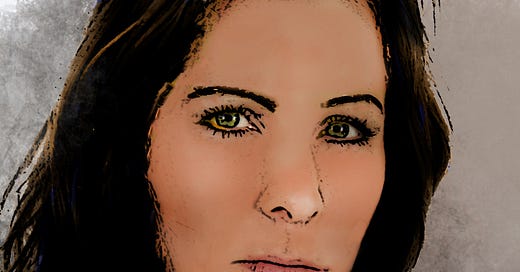"Unquickened" Excerpt: Minerva's Reunion
Father/daughter relationships are complicated--especially when daughter is more like her father than she wants to admit.
Oh hey, Internet--is it already the third week of May??
This week, I'm bringing you another more obscure scene that I really love--this one between one of the quieter characters and her father. Minerva has been important to the series so far, but her real contribution will come in the final book, so I haven't shared as much about her as I have about the others.
Honestly, Minerva prefers it that way.
Minerva and her father have a complicated relationship that was only hinted at up to the point of their reunion in Unquickened, but I needed to flesh him out a bit to set up some of what's to come. I gave her this moment of reunion so that whatever happened next, she would at least have a moment of homecoming to look back on.
Enjoy!
The passageways were just like she remembered—dark, peaceful, full of the history of the sayada. Minerva padded through them with the familiarity of a child returning home, hands snaking along the walls, recalling moments of quiet when she had retreated far from the duties of the sayas and found solitude and a moment to seek Alshada—the One Hand—when Sayana Muriel would not miss her.
She knew the way to his offices. She had always known. She had followed the young prince once, after he met a wayward saya in the passageways and done what he came to do. She didn’t care then—she wanted to, but her old tribal training echoed in her head, and she could only think that Alfrig’s only concern would have been that the saya wanted the encounter. Minerva couldn’t speak to the willingness of the saya, and on another night, dressed as an earth guardian, she might have confronted the young prince.
But not that night. Not when she wanted to find her way into the castle.
Minerva touched the walls again, as if seeking some ancient wisdom, some memory that her Sidh ancestors might have carved into the stones when they built these corridors. Her fingers played along stone and mortar, but they brought no memories that weren’t already there. She knew the way—knew it as if she had been born knowing it. She couldn’t say how she could remember these paths so vividly and still needed to ask directions for the simplest route into Torlach, but she knew—she knew exactly how to find the royal repha.
The corridors were quiet when she emerged from the passages, and she tucked her hair up into her hat so that her braids and breeches would not draw attention. She adjusted the pouch slung across her shoulder. He would be proud of me. I hope. If I could tell him the healing I’ve accomplished, would he be proud?
She encountered few servants and no members of court as she wound her way through the castle to his offices. When she arrived, she took a deep breath and knocked softly, hesitantly.
His voice came back resonant and confident—a man who knew his value and the value of his knowledge and position. “Come.”
She turned the latch. One Hand, give me wisdom. She entered the room and realized she was in an antechamber. “Hello?”
He emerged from another room behind a curtain. He walked around the room lighting candles. “I’m so sorry. The servants have not been by, it would appear.”
“It’s all right. I don’t need much light. For why I came.”
He turned, slowly, his eyes full of water. He lifted a hand to his mouth. “No.”
She shrugged. “Hello, Father.”
Her father, Repha Felix, former Chief Healer of the Nine Seas, exiled because a noblewoman died in childbirth under his care, a man without a home, a man whose own wife died because she missed her home so much—or so he’d always said—a man who had never once lacked words—appeared to be speechless. He could only stare, hand over his mouth, shaking his head.
She shifted her feet and cleared her throat. “I am sorry that I didn’t—that I haven’t—” She wet her lips.
He crossed the room, dropped his hand, and pulled her into an embrace that she could not have pulled away from even had she wished it. “Gods be praised,” he whispered against her ear. “Gods be praised. My child, Minerva, I have feared for you—prayed for you—all these years.” He finally drew back, put his hands on her head, and stared. “Where have you been, child? You’ve grown! You’re a woman—not the girl who left my house in a petulant fury all those years ago.”
She smiled under her tears. “I was petulant. I confess. I was cruel, and I should not have—”
“No, this is not the time for recriminations.”
“But Father, I need to say this—this is why I came.” She pulled away and put space between them. “I understand, now. I know why you wanted me to go back to Espara. I see that you only wanted the best for me, and you thought it was in Espara, and I thought it was elsewhere. I should have listened.”
“You wish you had gone to Espara?”
She shrugged. “I don’t know. Perhaps. It wouldn’t have been any worse than anything else.”
He took her hand and led her to a chair and sat next to her. “Where did you go?”
She sighed and looked down at her hands, twisting and turning her fingers in her lap. “I went to the tribes. At first. I trained to be an earth guardian. I married.”
“Married.”
She nodded. “You would have liked him, Father. He was like you, in some ways. He never met a man he couldn’t talk with. He had a gift for telling stories. But he was tribal, through and through.” Her breath caught in her throat, and she couldn’t talk around her tears.
He reached for her hand again. “What was his name?”
Minerva sniffed. “Edwin.”
“Edwin. A tribesman.” He paused. “Do I have grandchildren?”
Minerva shook her head. “He died. On the hunt. We didn’t have time. We were barely wed for a single moon before he was gone.”
Felix wrapped her hands in his. “I am so sorry, Minerva. I wish I had been there to comfort you.”
She let out a long breath. “I came to the sayada, after—when I couldn’t finish my training as a guardian because I was so far gone in grief.” And guilt and shame. Oh, Edwin, why? “I came here. The sayas took me in. I became one of them.”
Felix sat very still. “You were here? Next to me?”
She nodded.
“For how long?”
“Years. I took vows. I planned to serve Alshada for the rest of my life, but Braedan came.”
“And you lost the sayada, too.”
She nodded.
Felix let out a long breath and folded his hands in his lap. “I did not agree with him—with that. What he did.”
“But you did nothing to stop it.” Minerva raised her head, anger and grief rising in her chest. “Those women were my friends—my sisters. And because of him, because no one stopped him, I lost that, too.”
“What would I have done, Minerva?” He gestured toward the sayada. “What could I have done? I live here at the pleasure of whoever holds the keys to the front gate. I am a healer, a man of medicine, not a warrior or a politician. And I cannot allow anyone to discover why I was forced to leave Espara.” He spread his hands. “My position has always been tenuous.”
She stood and folded her arms. “And this is why we have always been at odds. You call yourself a man of principle, a man who cares about justice, and yet you do nothing—nothing—to promote it!”
“I ask you again, Minerva—what would you have me do?” He stood and faced her. “I have no army, no power. What would you have me do?”
She bit her lip around the tears and shook her head. “I don’t know, but not this.” She gestured around the room. “Not this—not hiding away behind tinctures and ointments and hoping that no one discovers your great shame.”
He said nothing for a long time. “Tell me what you have done.”
“What?”
“Tell me what you have done—where you have been, what steps you have taken to defend your principles.”
She sighed. “I learned the healing arts and the earth magic. I thought perhaps I was to be like you. I hoped to find meaning and purpose in the tribes, but after Edwin died, I lost myself.” She shook her head and swiped her eyes dry. “And then I hoped I would find it here, in the sayada, but I could never really forget the tribal training. Perhaps it made me too wild. In the sayada, I served the poor, the downtrodden, but it wasn’t enough. When Braedan showed up and threatened the sayada and the tribes, I left to warn the tribes, and I tried to protect the sayas I could find, but I failed.” She sat, folded her hands, slumped in her chair. “I failed. Anything that has happened in Taura or the tribes, any good that has come—it has not been because of me.”
Felix sat again and leaned toward her. “What of those you fed and clothed in the sayada? What of those you healed with your skill? Have you not made a difference for those?”
“Yes. Perhaps.” And perhaps for Taura, if Braedan succeeds in reclaiming his throne.
“And do you not think I have had to content myself with the same—to understand that lofty ideals do nothing for one who is ill or in pain?” He paused. “Minerva, we are healers. We have a different call—perhaps an apolitical one. We are called to heal bodies. Healing countries—that’s for others to do through other means.”
Minerva has, by far, the longest and slowest character arc of anyone in this series. I think in many ways, her journey mirrors the one most of us take--one of fits and starts, reversals and lunges and side quests, great leaps forward and stumbles when we land, separations and reunions, and all of them culminating, we hope, in a satisfying resolution.
Maybe that's why I like her so much--I'm hoping my own journey has a satisfying resolution.
Anyway, it's back to the salt mines for me. One more week of excerpts, and then I'll let you all know how it's gone!






Yes! I love these side-stories.